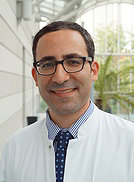Intensifying the radiotherapy dose in prostate cancer patients with PSA recurrence after prostatectomy does not increase the biochemical recurrence-free survival
In an attempt to define the optimal dose of salvage radiotherapy in prostate cancer patients with a biochemical progression after surgical removal of their tumour, the phase III multicentre SAKK 09/10 trial failed to show a clinical benefit for the use of a more intense radiotherapy regimen. Moreover, the increased intensity of the radiotherapy resulted in more gastrointestinal toxicity.
Introduction
Radical prostatectomy is the most widely used treatment option for patients with localised prostate cancer. However, biochemical progression can occur in up to 50% of patients in the post-prostatectomy. For these patients, salvage radiotherapy (RT) is the only curative treatment option. However, the optimal dose of salvage radiation remains to be undefined, with retrospective analyses estimating that biochemical progression-free survival (PFS) is improved by approximately 2.5% per Gy. At ASCO GU 2021, results of a prospective, randomised phase III trial were presented assessing the efficacy and safety of a dose-intensified RT regimen in comparison to the standard, conventional dose.
The multicentre SAKK 09/10 trial randomised 350 prostate cancer patients, with a PSA recurrence after prostatectomy to receive either intense-dose RT (70 Gy in 35 fractions) or conventional dose RT (64 Gy in 32 fractions). Eligible patients were required to have stage pT2a-3b disease and underwent an R0-1 resection. PSA recurrence was defined as 2 rises in PSA, with the final being >0.1 ng/mL, or 3 consecutive rises, but not exceeding 2 ng/mL. Key exclusion criteria included any evidence of macroscopic local recurrence or lymph node metastases, and a PSA persistence > 0.4 ng/mL. Patients were not allowed to have received hormonal therapy. The primary endpoint was freedom from biochemical progression (FFBP) (PSA ≥0.4 ng/mL and rising), with secondary endpoints being clinical PFS, time to hormonal treatment, overall survival (OS), acute and late toxicity, and quality of life.
No significant improvement in freedom from biochemical progression with intense dose
At time of randomisation, the median PSA of patients in the trial was 0.3 ng/mL. Of the 350 patients in the study, 344 patients were included in the intention-to-treat analysis. At a median follow-up of 6.2 years, a total of 138 biochemical progression events had occurred. Intense-dose RT was found to provide no significant benefit in FFBP, with the standard-dose RT providing a median FFBP of 8.2 years, compared to 7.6 years with the intense dose (HR[95%CI]: 1.14[0.82-1.60], P= 0.44). Also a subsequent subgroup analysis failed to identify a subgroup of patients who did benefit from the more intense RT regimen. No significant benefit in PFS (HR[95%CI]: 0.97[0.65-1.42], P= 0.86), or time to androgen deprivation therapy (HR[95%CI]: 1.03[0.63-1.69], P= 0.91) was found between both arms.
Late grade 2 and grade 3 genitourinary toxicities occurred in 21% and 8% of patients receiving standard-dose RT, and in 26% and 4% of intense-dose patients (P= 0.81). Conversely, late grade 2 and grade 3 gastrointestinal toxicities occurred in 7% and 4% of standard-dose patients, and 20% and 2% of intense-dose patients (P= 0.009). Quality of life outcomes were comparable between the two study arms, with no significant difference found between changes in urinary or bowel symptoms from baseline.
Conclusion
In this randomised phase III trial of intense-dose RT (70 Gy) and standard-dose RT (64 Gy), dose-intensified salvage RT failed to improve the rate of biochemical free survival. Moreover, the regimen was associated with an increased rate of late gastrointestinal toxicity.
Reference
Ghadjar P et al., Dose-intensified versus conventional dose-salvage radiotherapy for biochemically recurrent prostate cancer after prostatectomy: Six-year outcomes of the SAKK 09/10 randomized phase III trial. Presented at ASCO GU 2021; Abstract 194.

